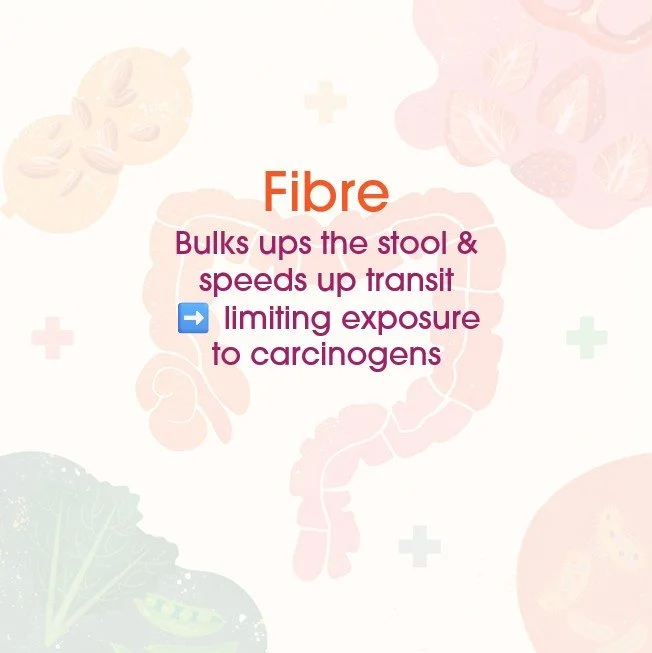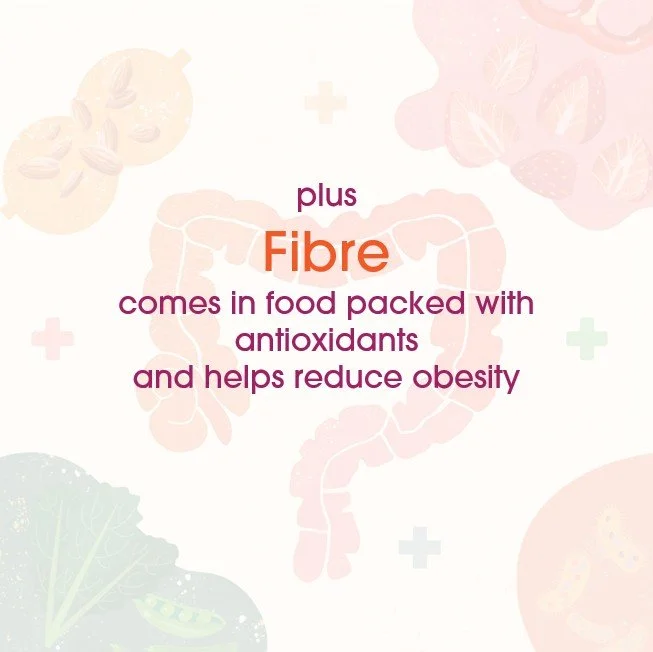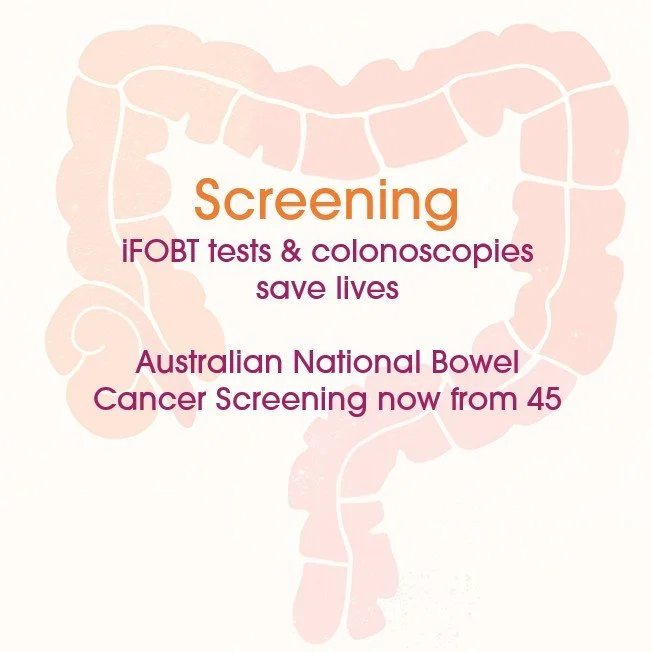How fibre reduces colon cancer risk
This week’s blog is a personal one. It covers the number one reason why I try and pack in 28g of fibre each day. Yep, the improvement in regularity is great, but for me it is the knowledge that fibre reduces bowel cancer risk that keeps me on track. I’ve had a couple of pesky polyps removed and I’m taking that as a warning sign to make positive changes. Most polyps are harmless, but some can develop over time into a cancerous tumour.
My guess is that that I’m not the only one concerned about colon cancer. Sadly, many of us know someone that has been affected by bowel cancer, also known as colorectal cancer.
Bowel cancer is common in Australia, with an estimated 15,542 new cases in 2024, making it the fourth most commonly diagnosed cancer in the country. Around 1 in 21 people (4.8%) will be diagnosed with it by the age of 85.
While it is most prevalent in people over 50, the rates of bowel cancer in younger adults are increasing, and Australia has some of the highest rates for those under 50 globally.
Researchers are perplexed about the cause of growth in the younger cases, but have identified some factors that reduce colon cancer risk. Research indicates up to 34% of bowel cancer cases may be prevented by a healthy lifestyle, increasing to 61% when combined with sigmoidoscopy/colonoscopy screening.
High on the list of positive lifestyle changes is increasing fibre intake. This week’s blog explains how that works and provides tips on other lifestyle changes you can make to reduce your colon cancer risk.
If science is not your thing - skip to the end for actionable tips you can get started on today.
First we’ll start with the many ways that high fibre intake reduces colon cancer risk.
Less contact with carcinogens
Here’s where that regularity fix really comes into it’s own. Insoluble fibre in particular helps waste to pass through the colon more quickly limiting carcinogen exposure to the colon lining. Fibre also absorbs water and bulks up the contents of the gut effectively diluting any harmful compounds that are present. Both factors reduce exposure to any carcinogens present in the colon contents.
Fibre boosts beneficial bacteria.
Prebiotic fibre provides food for the good bacteria in your gut and these interact with your immune system. For example, the presence of beneficial bacteria, such as Bifidobacterium inhibit colon progression to cancer through production of anti-inflammatory metabolites and immune modulation. However, Lactobacillus and Bifidobacterium can also promote T cells and the production of pro-inflammatory cytokines that are crucial for anti-tumour responses.
Fermentation of fibre make SCFAs
Fermentation of fibre in the colon leads to production of short chain fatty acids (SCFAs) - such as butyrate, propionate and acetate. These have a range of benefits with respect to colon health:
Make it stand out
The SCFAs reduce the pH of the colon contents. This inhibits the conversion of primary bile acids into harmful secondary bile acids. Secondary bile acids promote cancer by damaging DNA, increasing reactive oxygen species, disrupting cell membranes, and promoting cell proliferation, invasion, and tumour growth.
Butryrate is a primary fuel for the colonocytes - the cells that line the colon and help to maintain the integrity of the gut barrier, preventing entry of harmful chemicals.
Butryate also enhances expression of the tight junction proteins in these cells further strengthening the barrier.
Short chain fatty acids also have range on effects on the immune cells and cell signalling chemicals (cytokines). They modulate the hosts immune response creating an enviroment that is protective against colon cancer. For example, they bind to receptors on immune cells (dendritic cells) leading to decreased production of pro-inflammatory cytokines, and increased production of anti-inflammatory cytokines. They also support proliferation of regulatory T cells and suppress inflammatory TH17 cells. These anti-inflammatory effects all create an environment that is has a protective effect against colon cancer. Butyrate also promotes cell death in cancer cells and anti-tumour immunity.
Fibre comes packaged with anti-oxidants
Fibre rich foods are derived from plants and especially in the case of fruit, vegetables, nuts and seeds also provide vitamins and minerals with anti-oxidant activity.
and helps with Weight Management
Fibre-rich foods are filling, which can help you maintain a healthy weight. Obesity is a risk factor for bowel cancer.
Great fibre sources
Whole grains are a great source of fibre, along with fruit, vegetables, nuts and seeds and legumes. Some of those foods also contain FODMAPs and gluten, which are problematic for some. Check out the Best Ever Poop Plan for plenty of low FODMAP alternatives. Our Superflora range are also good gluten-free and low FODMAP fibre sources. The shakes provide 7g of fibre per serve, whilst the Boosts and hot drinks provide 5g of fibre per serve.
Other Powerful Lifestyle Changes
Beyond adding fibre there are other changes you can make.
Quit smoking
Smoking is a major risk factor for development of colon cancer. Tobacco exposure is also linked to increased risk of serrated polyps, a precursor to cancer that can be more difficult to spot during colonoscopies than other types of polyps.
The more you smoke and the longer you smoke the greater the risk. The flip-side of that is that quitting smoking at any age offers significant health benefits and will reduce your risk.
Quit or cut down on alcohol
Similarly, quitting or decreasing your alcohol intake will reduce your colon cancer risk. Alcohol is converted to acetaldehyde, which is mutagenic. There are no safe amounts of alcohol.
Reduce meat intake
Eating too much red meat has been linked with an increased risk of bowel cancer. In particular, eating processed meats such as bacon, ham, salami and some sausages has been strongly linked with an increased risk of bowel cancer.
Cutting your red meat intake down to a couple of portions per week is a good idea, and we’d recommend cutting out processed meats altogether.
Also think about the way you are preparing your meat. Drop the temperature and avoid charring. If you are barbequeing protect your meat with marinade, and consider cooking mainly in the oven and just finishing on the BBQ.
Charring increases production of mutagenic heterocyclic amines and polycyclic aromatic hydrocarbons. The haem in the meat is also broken down in to harmful N-nitoso chemicals, which can damage the cells that line the bowel. The nitrates and nitrates used to preserve processed meat also produce these N-nitroso chemicals and can lead to bowel cancer.
Lower fat intake
Reduce the fat in your diet. A high fat diet is linked to production of those secondary bile acids that have harmful effects in the colon.
Add a glass of milk or two
Multiple studies have shown that dairy products and calcium supplements are linked to a decreased risk of bowel cancer. Consuming 400 grams of dairy products per day decreases risk by 15%. Similarly, the consumption of 200 grams of milk or 200mg of dietary calcium per day was associated with a 6% decreased bowel cancer risk.
There are many lactose-free options available in the supermarkets - or you can have a go at making your own. If you are vegan, we recommend you opt for calcium-fortified soy milk or almond milk.
Calcium helps reduce bowel cancer risk by creating a protective "soap" that binds to potentially damaging bile and fatty acids in the gut, preventing them from harming the colon lining. It also influences cell processes like differentiation and proliferation, which helps maintain the integrity of the gut tissue and reduces the risk of cancerous cell growth.
Exercise
Try to be physically active everyday. Research has shown that recreational physical activity can reduce colon (but not rectal) cancer by 16%.
Screening
Most importantly, take advantage of the National Bowel Cancer screening program. This can pick up precancerous changes early and saves lives. The iFOBT tests used in the screening can find tiny amounts of blood in your poo that may be a sign of bowel cancer. The good news is that if found early, over 90% of bowel cancers can be successfully treated.
The eligible age range for the program in Australia has changed from 50 to 45 years. Eligible Australians aged 45 to 74 can now receive a free test kit every two years. People aged 45 to 49 can request their first kit here, while those aged 50 to 74 will continue to automatically receive their kits in the mail.
People ages 40-45 in high risk groups perhaps due to inflammatory bowel disease, family history, smoking or ancestry may also want to discuss screening via iFOBT or colonoscopy with their GP.
Screening is for people without symptoms. You should consult your GP straight away if you have any symptoms of bowel cancer – a persistent change in bowel habits (diarrhoea, constipation, narrower stools), abdominal pain, bloating, blood in the stool or from the rectum, a feeling of incomplete bowel emptying, unexplained weight loss, and persistent tiredness or weakness.
Actionable Tips
Gradually build up to 28g of fibre per day from a variety of plant foods. This will reduce risk by bulking up the stool, keeping things moving and feeding your good bacteria that convert fibre into protective short chain fatty acids
Try our Best Ever Poop Plan for low FODMAP fibre options and for an easy top up enjoy some Superflora each day
Increase your water intake along with your fibre to keep things moving (especially if you are prone to constipation)
Quit smoking and reduce alcohol
Cut down on red meat, cook it gently and cut out processed meats completely
Lower your fat intake
Increase your milk / calcium intake - opt for lactose-free if you need to
Exercise daily
Take part in bowel cancer screening
Head to your GP to get any new gastrointestinal symptoms, weight loss or persistent tiredness checked out quickly
References:
Bowel Cancer Australia have a wide range of fabulous resources
Bingham, S. A., et al. (2003) European Prospective Investigation into Cancer and Nutrition (2003). Dietary fibre in food and protection against colorectal cancer in the European Prospective Investigation into Cancer and Nutrition (EPIC): an observational study. Lancet, 361, 1496–1501. https://doi.org/10.1016/s0140-6736(03)13174-1
Skulsky, S. L., et al. (2024). Associations between Dietary Patterns and Incident Colorectal Cancer in 114,443 Individuals from the UK Biobank: A Prospective Cohort Study. Cancer epidemiology, biomarkers & prevention : a publication of the American Association for Cancer Research, cosponsored by the American Society of Preventive Oncology, 33(11), 1445–1455. https://doi.org/10.1158/1055-9965.EPI-24-0048
Zhang, C., et al. (2025). Gut microbiota in colorectal cancer: a review of its influence on tumor immune surveillance and therapeutic response. Frontiers in oncology, 15, 1557959. https://doi.org/10.3389/fonc.2025.1557959
Blog written by: Noisy Guts co-founder Dr Mary Webberley. Mary has a background in biology, with two degrees from the University of Cambridge and post-doctoral research experience.








